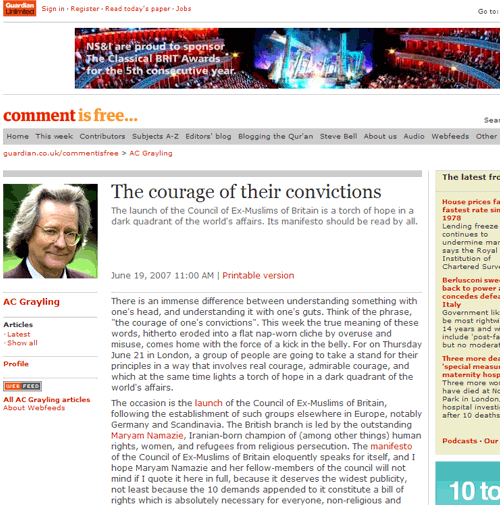The courage of their convictions
AC Grayling
June 19, 2007 11:00 AM
There is an immense difference between understanding something with one’s head, and understanding it with one’s guts. Think of the phrase, “the courage of one’s convictions”. This week the true meaning of these words, hitherto eroded into a flat nap-worn cliche by overuse and misuse, comes home with the force of a kick in the belly. For on Thursday June 21 in London, a group of people are going to take a stand for their principles in a way that involves real courage, admirable courage, and which at the same time lights a torch of hope in a dark quadrant of the world’s affairs.
The occasion is the launch of the Council of Ex-Muslims of Britain, following the establishment of such groups elsewhere in Europe, notably Germany and Scandinavia. The British branch is led by the outstanding Maryam Namazie, Iranian-born champion of (among other things) human rights, women, and refugees from religious persecution. The manifesto of the Council of Ex-Muslims of Britain eloquently speaks for itself, and I hope Maryam Namazie and her fellow-members of the council will not mind if I quote it here in full, because it deserves the widest publicity, not least because the 10 demands appended to it constitute a bill of rights which is absolutely necessary for everyone, non-religious and otherwise, to adopt and observe now that the world is again experiencing, with such bitterness, widespread religion-generated difficulties.
One point that has to be kept in mind here, because it illuminates the following document with the burning light of urgency, is this: apostasy (abandoning one’s religion) by a Muslim is to this day regarded as a crime punishable by death in countries governed by Islamic law (it once likewise invited death in Christianity). This is why the council is the embodiment of courage, and why the principles in its 10 demands are so vital.
Manifesto of the Council of Ex-Muslims of Britain
We, non-believers, atheists, and Ex-Muslims, are establishing or joining the Council of Ex-Muslims of Britain to insist that no one be pigeonholed as Muslims with culturally relative rights nor deemed to be represented by regressive Islamic organisations and “Muslim community leaders”.
Those of us who have come forward with our names and photographs represent countless others who are unable or unwilling to do so because of the threats faced by those considered “apostates” – punishable by death in countries under Islamic law.
By doing so, we are breaking the taboo that comes with renouncing Islam but also taking a stand for reason, universal rights and values, and secularism.
Whilst religion or the lack thereof is a private affair, the increasing intervention of and devastation caused by religion and particularly Islam in contemporary society has necessitated our public renunciation and declaration. We represent a majority in Europe and a vast secular and humanist protest movement in countries like Iran.
Taking the lead from the Central Council of Ex-Muslims in Germany, we demand:
- Universal rights and equal citizenship for all. We are opposed to cultural relativism and the tolerance of inhuman beliefs, discrimination and abuse in the name of respecting religion or culture.
- Freedom to criticise religion. Prohibition of restrictions on unconditional freedom of criticism and expression using so-called religious “sanctities”.
- Freedom of religion and atheism.
- Separation of religion from the state and legal and educational system.
- Prohibition of religious customs, rules, ceremonies or activities that are incompatible with or infringe people’s rights and freedoms.
- Abolition of all restrictive and repressive cultural and religious customs which hinder and contradict women’s independence, free will and equality. Prohibition of segregation of sexes.
- Prohibition of interference by any authority, family members or relatives, or official authorities in the private lives of women and men and their personal, emotional and sexual relationships and sexuality.
- Protection of children from manipulation and abuse by religion and religious institutions.
- Prohibition of any kind of financial, material or moral support by the state or state institutions to religion and religious activities and institutions.
- Prohibition of all forms of religious intimidation and threats.


